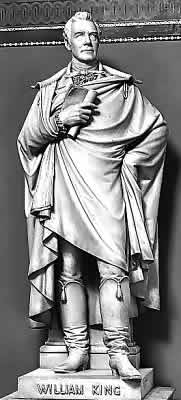William King (Simmons)
William King is an 1878 marble sculpture depicting Maine's first governor of the same name by Franklin Simmons, installed in the United States Capitol, in Washington, D.C., as part of the National Statuary Hall Collection. It is one of two statues donated by the state of Maine.[1] The statue was accepted in the collection by Senator Hannibal Hamlin (who himself became the subject of Maine's second entry to the Collection) and Senator James G. Blaine on January 22, 1878 who rhapsodized upon the occasion, “He restrained the wrath of the impudent, quickened the zeal of the laggard, dissipated the fears of the doubting and molded his adherents and followers into a compact, cooperative, effective force . . . . He, more than any other man created the State of Maine.” [2]
| William King | |
|---|---|
 | |
| Artist | Franklin Simmons |
| Year | 1878 |
| Medium | Marble sculpture |
| Subject | William King |
| Location | Washington, D.C., U.S. |
The work is one of the few in the Collection done in an overtly neo-classical style, with King's cloak serving as much as a toga as anything else. Simmons, upon being commissioned to create a Roger Williams statue for Rhode Island moved to Rome where both good marble and good assistants were cheaply found, then moved there permanently so his King statue would have been made there. Sculptor and critic Lorado Taft found the King statue “well poised” but “with little vivacity or charm of modeling.” He then notes the severe treatment of the drapery.”[3]
See also
References
- Architect of the Capitol Under the Direction of the Joint Committee on the Library, Compilation of Works of Art and Other Objects in the United States Capitol, United States Government Printing Office, Washington 1965 p. 211
- Murdock, Myrtle Chaney, National Statuary Hall in the Nation’s Capitol, Monumental Press, Inc., Washington, D.C., 1955 pp. 82–83
- Taft, Lorado, History of American Sculpture, The MacMillan Company, New York, 1903, revised with new matter, 1925, p. 248
External links
